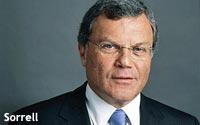Sorrell: POG Strategically Flawed; Rationale Is "Nonsense;" "Neutral Impact" On WPP
- by Steve McClellan @mp_mcclellan, August 29, 2013
 WPP
CEO Martin Sorrell spent much of a Thursday morning conference call with analysts pointing to strategic flaws in the proposed merger of Publicis Groupe and Omnicom Group, saying its impact on his
company would be “neutral” at worst but potentially “highly positive.”
WPP
CEO Martin Sorrell spent much of a Thursday morning conference call with analysts pointing to strategic flaws in the proposed merger of Publicis Groupe and Omnicom Group, saying its impact on his
company would be “neutral” at worst but potentially “highly positive.”
He called the companies’ suggestion that the merger was necessary to bulk up to compete with the Googles of the world “nonsense” and a “smoke screen” to redirect focus away from the impact that the merger might have on traditional media and communications businesses.
Sorrell also said the merger was a “strategic U-turn” for both companies, given Omnicom’s focus on North America and less on new markets and new media where Publicis Groupe has focused efforts in recent years.
advertisement
advertisement
Sorrell also suggested that client defections from Publicis and Omnicom will escalate through the review process as marketers have some time to digest the implications of the merger. There will be “subtle” reactions to the conflict issue, as opposed to clients proclaiming switches are being made directly as a result of the merger, he said.
Sorrell cited several examples of clients already deciding to move away from a Publicis or Omnicom incumbent via the review process since the merger, including British Airways, Emirates airline and Hershey. That’s all happened in the last couple of weeks, Sorrell said, asserting that “non-consultation” can lead to “unintended consequences.” He added: “It pays to be paranoid.”
Sorrell also suggested that it would be difficult to run the merged company from three different headquarters—the Netherlands, its proposed actual base, along with continued major presences in Paris, current HQ for Publicis and New York, where Omnicom is now based.
Sorrell also predicted that the regulatory approval process would be arduous and take six to nine months “or longer.”
As to WPP’s own strategy, Sorrell stressed several times during the call that only the pace of it implementation would change. The company will continue to focus on new media, new markets, and data investment management. “But we’ll move faster,” he said, indicating the company wants new media and new markets to account for 40-45% of its business five years out, up from the previously targeted 30-35%.
Helping to get there will be an acquisition budget expected to average $465 million to $620 million annually, although some years that could rise to closer to $1 billion, Sorrell said, noting the company had made nearly 40 acquisitions in the first of 2013.
WPP reported first half of revenues of $8.2 billion, up nearly 5% for the first half. Organic revenue growth was up 2.4% for the half, which broke out to 2.1% in the first quarter and 2.7% in the second quarter. The company’s first half organic growth was slightly higher than that reported by Interpublic Group (2.3%) but lower than both Publicis Groupe (3.2%) and Omnicom (2.8%).


